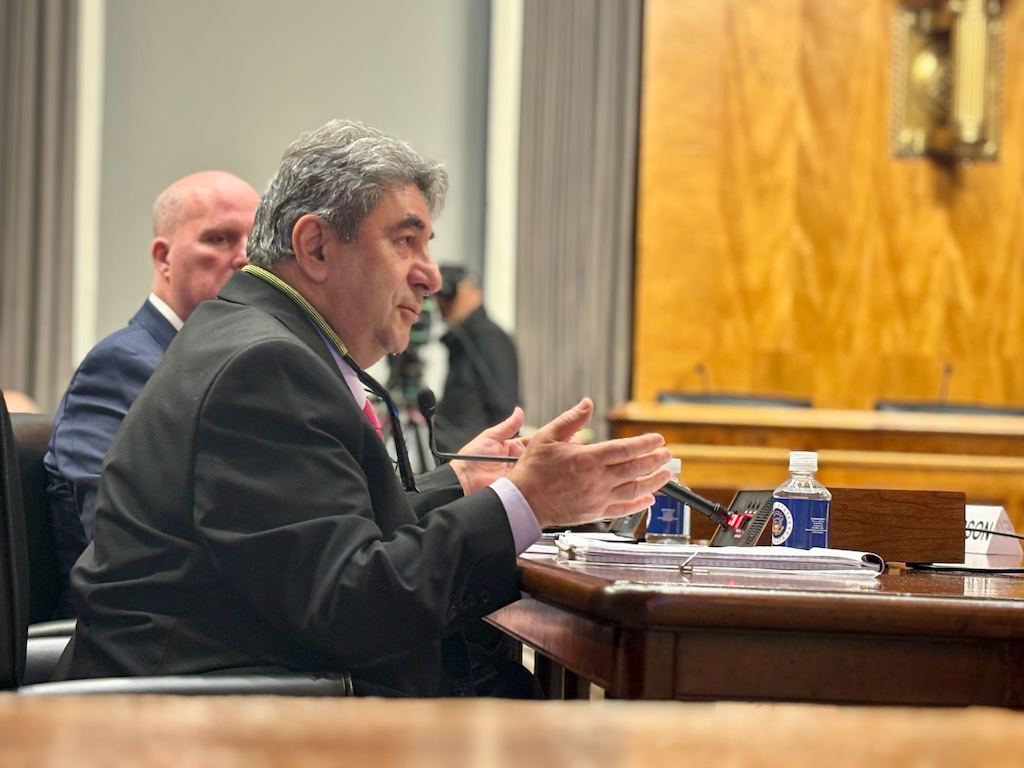WASHINGTON – Boeing Co. quality engineer Sam Salehpour on Wednesday raised concerns about manufacturing shortcuts taken by the company, warning a Senate panel that the flying public could be at risk.
There have been issues with the Boeing 787 Dreamliner program since 2013, according to Salehpour. Thousands of gaps in major joints of the planes’ fuselages are not being closed, he said. Boeing’s standard says that these gaps must be closed and are usually closed using shims, or filler when they exceed five-thousandths of an inch.
“When you are operating at 35,000 feet… the size of a human hair can be the matter of life and death,” Salehpour told the Senate Permanent Subcommittee on Investigations.
Boeing pushed airplane pieces together using excessive force, making it appear as though the gaps don’t exist when they actually do, which could result in premature metal fatigue failure, he said.
“Effectively they are putting out defective airplanes,” the whistleblower charged.
According to Salehpour, gaps on 29 inspected 787 planes were not properly addressed 98.7% of the time. When these gaps are drilled through, they fill with debris. Data from the same 29 inspected planes showed that the gaps were filled with debris 80% of the time, Salehpour said.
A Boeing spokesperson earlier told The Hill that the company is cooperating with the subcommittee.
“We have offered to provide documents, testimony, and technical briefings, and are in discussions with the subcommittee regarding next steps,” The Hill quoted the spokesperson as saying. Safety and production quality at Boeing have been under scrutiny following a blowout of a door panel on an Alaska Airlines 737 Max 9 in January.
Other witnesses criticized government agencies and their involvement in these safety incidents.
“There’s a reason commercial aviation has been historically safe and that’s because people worked extremely hard for decades,” Ed Pierson, a former Boeing manager and executive director at the Foundation for Aviation Safety said during the hearing. “To keep them safe, they told the truth, they admitted their mistakes. They didn’t downplay safety incidents. These agencies have become lazy, complacent and reactive.”
Pierson also criticized the National Transportation Safety Board for being “overly dependent” on Boeing and the Federal Aviation Administration, which he sees as a conflict of interest. He added that the Department of Transportation has been “completely useless” in helping the FAA do its job and has continued to take a hands-off approach.
“The FAA could have prevented an ever-increasing list of production quality defects,” Pierson said. “Instead, they’re surprised each time that occurs, showing how ineffective and reactive their oversight has become.”
Salehpour emphasized that he had raised concerns to Boeing about production and safety for the past three years, but was ignored, was told not to create delays and to “shut up,” he said.
“It is unbelievable to me that in the midst of this safety crisis at this corporation that what they’re doing is threatening their own engineers whose job it is to help identify potential safety concerns,” Sen. Josh Hawley, R-Missouri, said.
Salehpour had worked on the Boeing 787, raised concerns, and was then transferred to the Boeing 777. His worries were ignored in both cases, he said.
After sharing concerns with his boss, Salehpour said he received threatening calls on his personal phone and felt like his safety was threatened. He said he was told by his boss, “I would have killed someone who said what you said in the meeting.”
Despite threats and risks to his personal safety, Salehpour said he feels at peace knowing that if something were to happen to him, he feels that by coming forward he will have saved a lot of lives.
“This investigation has to include not only Boeing, it’s got to include how airlines maintain Boeing products, but it’s also got to look at the FAA and government and where government has potentially dropped the ball as well,” Sen. Ron Johnson, R-Wisconsin, said.
Subcommittee Chairman Richard Blumenthal, D-Connecticut, said he hopes the FAA will testify in a hearing in the future.
Boeing CEO Dave Calhoun last month announced his intent to step down at the end of the year. The aircraft manufacturer also has undergone other recent management shakeups.

